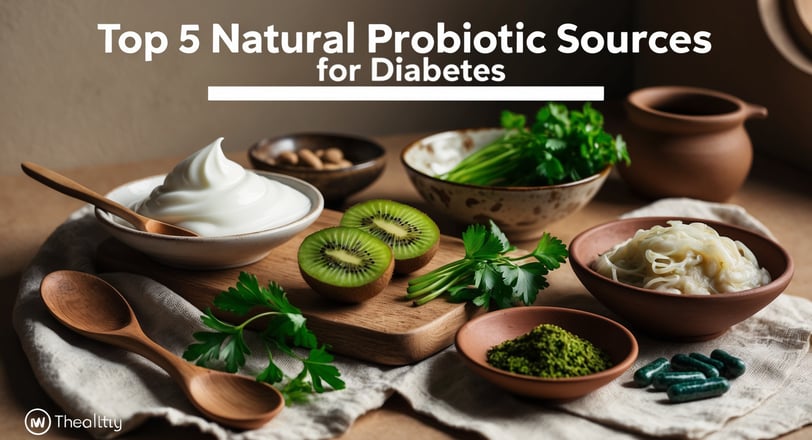Top 5 Natural Probiotic Sources for Diabetes 🌿
Top 5 Natural Probiotic Sources for Diabetes 🌿
Sophia Gold
8/9/20243 min read


Introduction: The Importance of Probiotics in Diabetes Management
Probiotics are beneficial bacteria that play a crucial role in maintaining gut health, which in turn influences many aspects of overall health, including blood sugar regulation. For individuals managing diabetes, incorporating natural probiotic sources into the diet can help improve insulin sensitivity, reduce inflammation, and support stable blood sugar levels. In this article, I’ll explore the top five natural probiotic sources that are both diabetes-friendly and nourishing.
1. Yogurt
What It Is:
Yogurt is one of the most popular and accessible sources of probiotics. It is made by fermenting milk with live bacterial cultures, such as Lactobacillus and Bifidobacterium, which promote a healthy gut microbiome.
Benefits for Diabetes:
Yogurt provides a rich source of probiotics that support gut health and improve digestion. When choosing yogurt, opt for plain, unsweetened varieties to avoid added sugars that can spike blood sugar levels.
How to Use:
Enjoy yogurt as a snack, breakfast option, or dessert. You can add fresh berries, nuts, or seeds for added flavor and nutrition. It can also be used as a base for smoothies or salad dressings.
2. Kefir
What It Is:
Kefir is a fermented milk drink that is similar to yogurt but has a thinner consistency and a tangy flavor. It contains a wider variety of probiotic strains, making it a potent source of beneficial bacteria.
Benefits for Diabetes:
Kefir supports gut health, enhances digestion, and helps regulate blood sugar levels. It also provides protein, calcium, and vitamins, making it a nutritious addition to a diabetes-friendly diet.
How to Use:
Drink kefir on its own, blend it into smoothies, or use it as a base for creamy salad dressings. Choose plain, unsweetened kefir to keep sugar intake low.
3. Sauerkraut
What It Is:
Sauerkraut is fermented cabbage that is rich in probiotics, fiber, and vitamins. The fermentation process introduces beneficial bacteria, which enhance the nutritional value of the cabbage.
Benefits for Diabetes:
Sauerkraut is a low-calorie, high-fiber food that helps support gut health and stabilize blood sugar levels. Its probiotics aid in digestion and reduce inflammation, making it beneficial for diabetes management.
How to Use:
Add sauerkraut to salads, sandwiches, or as a side dish. Be sure to choose unpasteurized sauerkraut to ensure it contains live probiotics.
4. Kimchi
What It Is:
Kimchi is a traditional Korean dish made from fermented vegetables, primarily cabbage and radishes, seasoned with spices like chili pepper, garlic, and ginger. It is rich in probiotics and has a spicy, tangy flavor.
Benefits for Diabetes:
Kimchi provides a potent dose of probiotics, fiber, and antioxidants, all of which contribute to better blood sugar control and overall health. The fermentation process also enhances the bioavailability of nutrients.
How to Use:
Enjoy kimchi as a side dish, mix it into stir-fries, or use it as a topping for grain bowls and salads. Like sauerkraut, choose unpasteurized varieties for probiotic benefits.
5. Kombucha
What It Is:
Kombucha is a fermented tea made by fermenting sweetened tea with a symbiotic culture of bacteria and yeast (SCOBY). It has a slightly effervescent, tangy flavor and is rich in probiotics.
Benefits for Diabetes:
Kombucha offers a unique way to consume probiotics while also providing antioxidants from tea. It can support gut health and help maintain stable blood sugar levels when consumed in moderation.
How to Use:
Drink kombucha as a refreshing beverage, but choose varieties with low sugar content. You can also use kombucha as a base for salad dressings or marinades.
Conclusion: Embrace Probiotic-Rich Foods for Better Diabetes Management
Incorporating natural probiotic sources like yogurt, kefir, sauerkraut, kimchi, and kombucha into your diet can be a powerful strategy for managing blood sugar levels naturally. These foods offer delicious and nutritious ways to support gut health, reduce inflammation, and improve insulin sensitivity. By making these probiotic-rich foods a regular part of your diet, you can take proactive steps toward better diabetes management and overall well-being.
Resources for Further Reading:
Healthline: The Benefits of Probiotics for Health
National Institutes of Health (NIH): Probiotics and Diabetes Management


